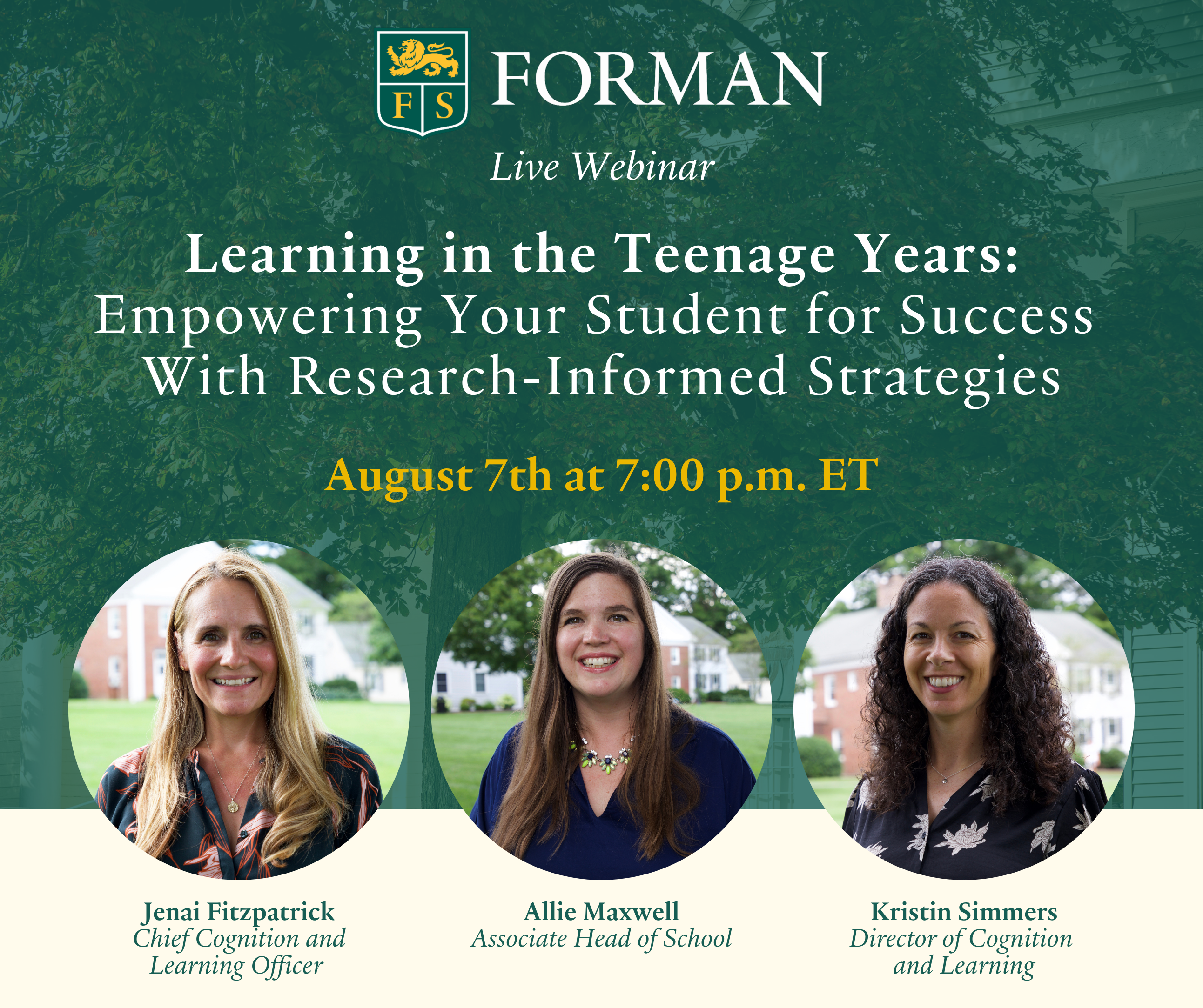Students with attention-deficit/hyperactivity disorder (ADHD) may face challenges in the classroom, including difficulty focusing, sitting still, and initiating tasks. At Forman School, we support students with ADHD in many ways and tailor our curriculum to ensure students remain engaged in their classes. Continue reading to learn more about ADHD and how students can stay excited about learning.
What is ADHD?
ADHD is classified as a Neurodevelopmental Disorder characterized by specific differences in the structure and function of an individual's brain, according to the Diagnostic and Statistical Manual of Mental Disorders, Fifth Edition (DSM-5). These differences manifest as patterns of inattention, hyperactivity-impulsivity, or both, which collectively interfere with activities of daily functioning.
Symptoms may present in varying degrees of intensity but must be present in two or more settings. Inattention is often observed as being off task, having trouble sustaining focus, disorganization, or inability to persist with challenges. Whereas hyperactivity and impulsivity are marked by excessive movements, talkativeness, restlessness, and a general tendency to “leap before looking.” The estimated prevalence of ADHD varies quite widely, with percentages of 3-9% of the population reported by research surveys.
Click here to read an article about the underlying causes of ADHD symptoms in children from the Child Mind Institute.
Challenges in the Classroom
At Forman, most students with ADHD struggle with attention deregulation or executive dysfunction. Attention deregulation means a student has difficulty consistently harnessing their attention in the right direction. These students may also have difficulty sustaining their attention, such as focusing on homework. At Forman, we help our students implement routines with a structured schedule that includes blocked-off study halls. Executive dysfunction affects students’ organization, time management, and planning. We offer executive function (EF) coaching, which helps students develop an understanding of themselves, their strengths, and their difficulties. Working 1:1 with a Certified Professional Co-Active Coach, students set short and long-term goals, create action steps, anticipate roadblocks, and design approaches for managing performance-related challenges using the student’s current course work.
Click here for more information about executive function coaching at Forman School.
Exciting Students about Learning
Incorporating different modalities in the classroom, including visual, auditory, and kinesthetic, helps keep students engaged and excited about learning. With 70-minute courses, the Cognition and Learning Department at Forman, in particular, intentionally chooses materials designed for adolescents to take an interest in. At Forman, our goal is for students with ADHD to become self-reflective, self-analytical, and introspective.
The Franklin Institute in Philadelphia, PA, has created high school curriculums about the adolescent brain and its neuroplasticity. One of the curriculums is the underpinning of a newly-launched class at Forman—the Executive Function Learning Lab. All 9th graders and new 10th graders take this course, which focuses on developing skills and strategies that can be practically applied with core course material throughout a student’s academic career, as well as life outside of the classroom, where EF challenges are also often experienced.
By examining their cognitive strengths and challenges, the course allows students to practice metacognitive awareness and self-reflection. The application of EF skills, using a student's current class content, is essential for meaningful understanding and owning/individualizing EF approaches. By intentionally analyzing one’s current learning strategies as they are applied in a specific class, students identify what works well and what is not and come up with new, more effective study techniques and approaches. This class was developed in partnership with Dr. George McCloskey, Professor, Author, and Director of School Psychology Research.
Furthermore, we teach students about ADHD in a neurological sense. In our course Brain Matters, students explore how they can use the science of learning to inform their academic habits of mind. Students understand what it takes to learn new information and key strategies and habits they can employ to succeed. The intention of the topics and research covered in this course is for students to build a greater sense of agency. Students delve into and discuss current scholarly articles surrounding research on neurodevelopment. As the course progresses, students examine and discuss the policy implications of neuroscience research on young people today.
By emphasizing the neurodevelopmental changes that occur during adolescence, students gain a holistic understanding of this developmental window. Understanding changes in teens’ brains and the impact that it has on one’s cognitive, personal, and social development is one of the primary goals of the course. By better understanding themselves as learners and how their brains process information, students gain skills and strategies to prepare them for the transition to college.
Overarching themes that permeate throughout the course offerings in Cognition and Learning are focused on students delving into how they can use the science of learning to inform their academic habits of mind, specifically in study skills and strategies. Students learn research-based strategies for planning when to study, developing an understanding of the studying process, and reinforcing knowledge. Strategies such as spaced practicing, interleaving, elaboration, dual coding, and retrieval practices are taught to help students prepare for tests and quizzes in content area classes. Students also learn multiple strategies on how to prepare for and take objective-style tests and essay-style tests to understand how to plan their time during a test, reduce anxiety, and create a proper essay for various assessments. The goal of this content and curriculum is to have students understand what it truly takes to learn new information and key strategies and habits they can employ to succeed.
By the end of their courses in Cognition and Learning, it is our goal for students to have the tools to advocate for themselves academically and socially. Ultimately, our intention is for students to gain an in-depth understanding of both themselves and their learning profiles.
Click here for more information from our Cognition and Learning Department.
Beyond Cognition and Learning courses, Forman offers classes and activities that ignite creativity for students, from robotics and boatbuilding to the Promethean Lab and the Lion’s Den Bistro. These types of classes and activities can help students with ADHD channel their energy and improve their focus elsewhere.
Blog content contributed by Devin Burkhart, Director of Cognition and Learning, and Dr. Maryellen Ruth, Director of the Forman Diagnostic Center.





